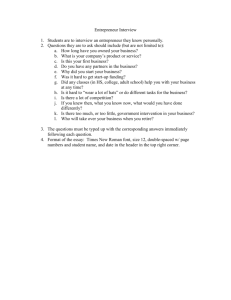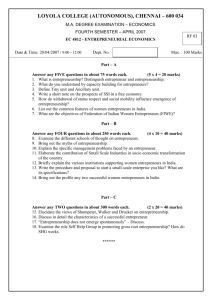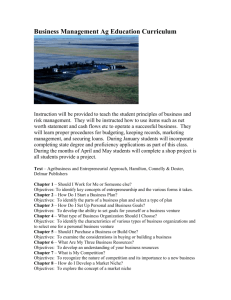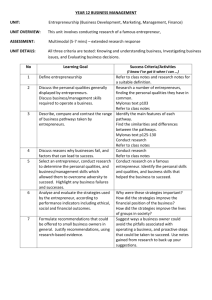Entr-Unit1
advertisement
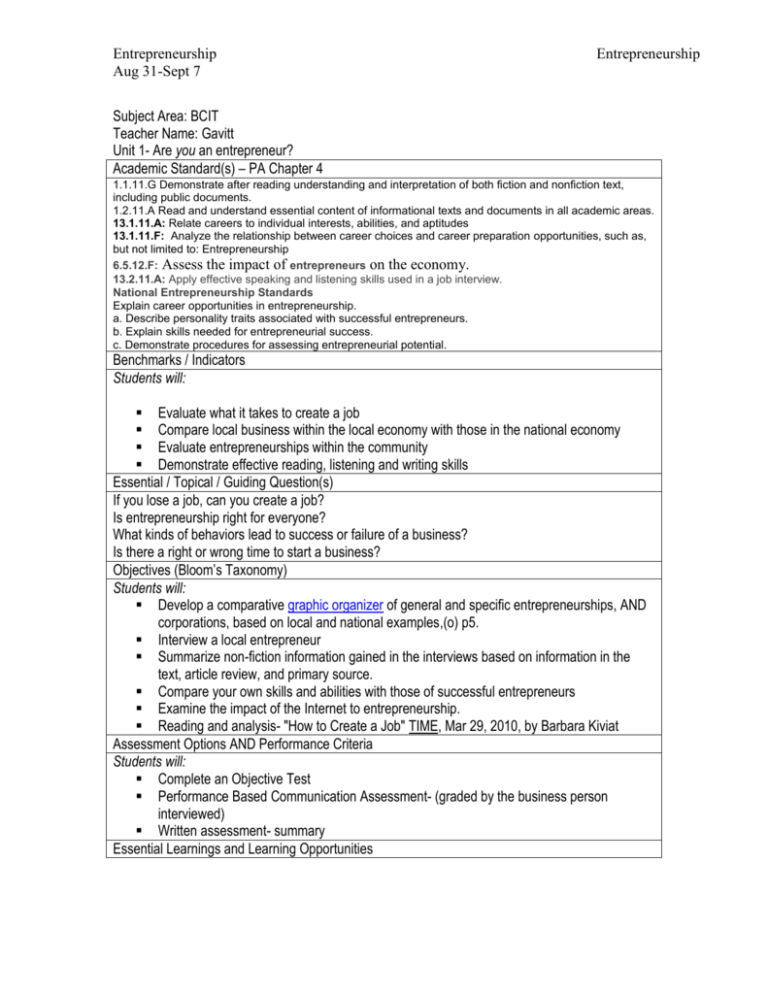
Entrepreneurship Aug 31-Sept 7 Entrepreneurship Subject Area: BCIT Teacher Name: Gavitt Unit 1- Are you an entrepreneur? Academic Standard(s) – PA Chapter 4 1.1.11.G Demonstrate after reading understanding and interpretation of both fiction and nonfiction text, including public documents. 1.2.11.A Read and understand essential content of informational texts and documents in all academic areas. 13.1.11.A: Relate careers to individual interests, abilities, and aptitudes 13.1.11.F: Analyze the relationship between career choices and career preparation opportunities, such as, but not limited to: Entrepreneurship 6.5.12.F: Assess the impact of entrepreneurs on the economy. 13.2.11.A: Apply effective speaking and listening skills used in a job interview. National Entrepreneurship Standards Explain career opportunities in entrepreneurship. a. Describe personality traits associated with successful entrepreneurs. b. Explain skills needed for entrepreneurial success. c. Demonstrate procedures for assessing entrepreneurial potential. Benchmarks / Indicators Students will: Evaluate what it takes to create a job Compare local business within the local economy with those in the national economy Evaluate entrepreneurships within the community Demonstrate effective reading, listening and writing skills Essential / Topical / Guiding Question(s) If you lose a job, can you create a job? Is entrepreneurship right for everyone? What kinds of behaviors lead to success or failure of a business? Is there a right or wrong time to start a business? Objectives (Bloom’s Taxonomy) Students will: Develop a comparative graphic organizer of general and specific entrepreneurships, AND corporations, based on local and national examples,(o) p5. Interview a local entrepreneur Summarize non-fiction information gained in the interviews based on information in the text, article review, and primary source. Compare your own skills and abilities with those of successful entrepreneurs Examine the impact of the Internet to entrepreneurship. Reading and analysis- "How to Create a Job" TIME, Mar 29, 2010, by Barbara Kiviat Assessment Options AND Performance Criteria Students will: Complete an Objective Test Performance Based Communication Assessment- (graded by the business person interviewed) Written assessment- summary Essential Learnings and Learning Opportunities Entrepreneurship Aug 31-Sept 7 Entrepreneurship Students will: Explain what it takes to become your own boss through an article review and through talking with real entrepreneurs in the community. Explore opportunities to become an entrepreneur Compare industry sectors where entrepreneurs are often found Discussion Presentation of questions, followed by discussion, and then related to text or research to dispel misconceptions about owning your own business. Graphic organizer using computers Students will construct a comparison of industry sectors and the entrepreneurial opportunities that exist in each After material is presented and articles read, students will interview a small business owner and compare the information collected to the information presented, to form a realistic and non-biased approach to entrepreneurship. They will summarize the experience. In-class activities will help students make this determination. Timeline: three class periods Differentiation: Content, Process (Learning Opportunities), Product (Assessment Options) Notes will be taken in class accompanied by a notes handout for anyone unable to attend or keep up. We will prepare a memo for the business owner asking their permission for an interview and a list of questions so students understand the importance of business etiquette and communication with the prospective entrepreneur. The entrepreneur will also be given a questionnaire to complete at the end of the interview. In some cases, the student may interview a family member. Closure To bring closure to the lessons, I will ask these basic questions to my students: What are the characteristics of an entrepreneur? Are all entrepreneurs alike? Can you be an entrepreneur? Why or why not? What are some advantages and disadvantages of entrepreneurship? What online presence did the local entrepreneurs have? What misconception did you have that was cleared up? Essential Materials Text Book – South-Western; Entrepreneurship Ideas in Action 1st and 4th eds. The Outliers, by Malcolm Glidewell Notebook, Pencil, or laptop Computer with Microsoft Word Overhead Projector and teacher laptop Rubric or Assessment Three classwork assignments One written summary An interview with an entrepreneur about his/her business and a survey from the entrepreneur about the student's performance. Short objective test Daily attendance and observation/questioning/notes check




